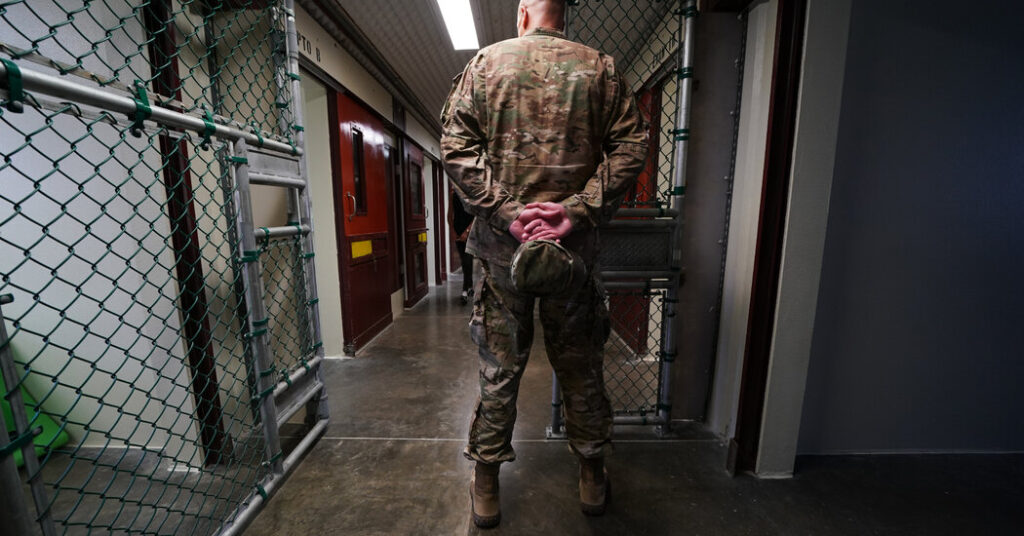When a military judge threw out a defendant’s confession in the Sept. 11 case this month, he gave two main reasons.
The prisoner’s statements, the judge ruled, were obtained through the C.I.A.’s use of torture, including beatings and sleep deprivation.
But equally troubling to the judge was what happened to the prisoner in the years after his physical torture ended, when the agency held him in isolation and kept questioning him from 2003 to 2006.
The defendant, Ammar al-Baluchi, is accused of sending money and providing other support to some of the hijackers who carried out the terrorist attack, which killed 3,000 people. In court, Mr. Baluchi is charged as Ali Abdul Aziz Ali.
He is the nephew of Khalid Shaikh Mohammed, the man accused of masterminding the plot.
The judge, Col. Matthew N. McCall, wrote that it was easy to focus on the torture because it was “so absurdly far outside the norms of what is expected of U.S. custody preceding law enforcement questioning.”
“However,” he added, “the three and a half years of uncharged, incommunicado detention and essentially solitary confinement — all while being continually questioned and conditioned — is just as egregious” as the physical torture.
Prosecutors are preparing to appeal.
But the 111-page ruling was the latest blow to the government’s two-decade-old effort to hold death penalty trials at Guantánamo Bay by sweeping aside a legacy of state-sponsored torture.
Military judges in the two capital cases at Guantánamo have rejected the use of confessions taken from prisoners after they were in C.I.A. detention, illustrating the enduring stain of a Bush administration decision after Sept. 11, 2001, to interrogate and hide suspected members of Al Qaeda in black sites rather than use the court-monitored law enforcement system.
From his capture in Pakistan in early 2003 to his transfer to Guantánamo in 2006, Mr. Baluchi was kept out of the reach of lawyers, a court and the International Red Cross, according to evidence presented at years of pretrial hearings.
In his first days in custody, Mr. Baluchi was deprived of sleep for 82 straight hours. He was shackled at the ankles and the wrists in a way that forced him to stand, naked, with a hood on his head. He was made to fear he would be drowned in a mock waterboarding technique while he was in a dungeonlike setting in Afghanistan.
In time, he was shuttled between five overseas prisons, including in Eastern Europe. Food and clothing were used as rewards for his cooperation with C.I.A. debriefers in a program described in court by two psychologists who carried out some of the interrogations for the agency.
The judge referred to classified C.I.A. accounts showing that Mr. Baluchi was questioned about Al Qaeda and his role in the Sept. 11 attacks more than 1,000 times before he was transferred to Guantánamo. Then, in January 2007, the Bush administration adopted a concept called clean teams.
The idea was to have agents who had not been involved in previous interrogations question a suspect anew to try to obtain admissible evidence for a court case. In the case of Mr. Baluchi, three F.B.I. agents questioned him over four days at Guantánamo in January 2007, four months after he was transferred there from a black site.
The F.B.I. agents wrote a memo containing his confessions, which Judge McCall rejected on April 11 as illegally derived from torture.
Prosecutors had argued that Mr. Baluchi’s brutal interrogations lasted only a few days. For the next three years, they said, he gradually became less afraid of his captors and in time voluntarily answered questions from the C.I.A. debriefers and, later, from the F.B.I. questioners at Guantánamo.
The judge disagreed. “The goal of the program was to condition him through torture and other inhumane and coercive methods to become compliant during any government questioning,” he wrote. “The program worked.”
Uncertainty over whether the statements would be admissible was one reason the prosecutors sought to settle the case with guilty pleas in exchange for life sentences rather than through a death-penalty trial.
Mr. Baluchi and his lawyers never reached a plea agreement. But Mr. Mohammed and two other defendants did in a settlement that the Justice Department is now trying to overturn. If the courts uphold the deal and the plea goes forward, Mr. Mohammed has agreed to let prosecutors use portions of his 2007 interrogations at Guantánamo at a sentencing hearing.
Government lawyers have to meet a high bar in appealing to reinstate Mr. Baluchi’s 2007 statements. In January, the military commissions appeals court upheld a judge’s decision to throw out the same type of evidence in the U.S.S. Cole case, the longest-running capital case at Guantánamo Bay.
In it, the appellate panel endorsed the analysis of the judge in that case that the C.I.A. had “conditioned” its captives “to answer questions from United States government officials — be they debriefers, interrogators or interviewers.”
In his third month at Guantánamo, Mr. Baluchi reported to a medical staff member that guards had withheld water from him “for 48 hours because he wrote his name in his shower with steam,” the judge noted.
Court testimony showed that each former C.I.A. prisoner’s cell was equipped with an intercom and individual shower that required little contact with guards. So Mr. Baluchi was punished for writing his name in a place where only he, the guards and the prison’s surveillance system could see it.
Moves between black sites started with a cavity search, the judge said in a section that explained the process in detail. Mr. Baluchi was blindfolded, and his ears and mouth were covered to prevent him from hearing or communicating with others.
“He was diapered and then strapped into a seat or strapped to the floor like cargo for however long the flight lasted,” the judge recounted. The prisoner “did not know where he was going or how long he would have to remain in a soiled diaper.”

